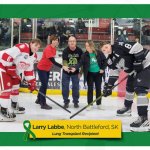
I am certainly aware of how fortunate it was that I was diagnosed early. This has reinforced how critical screening and early detection is for the long-term survival of lung cancer patients.
"In February of 2016, a surprising cancer diagnosis turned my life upside down. While in hospital for another condition, my CT scans showed a small nodule in my left lung's lower lobe. It was a shock for my family and me, a coincidental diagnosis of lung cancer. Our worlds stood still momentarily as we tried to grasp the meaning of the findings. I knew only too well the grim statistics associated in the past with a lung cancer diagnosis. Despite being reassured that the nodule was indicative of early-stage lung cancer, my mind jumped back and forth between thinking the best and believing the worst. I thought about my family and worried about them and for our future.
Following discharge from the hospital, I entered the world of fear, anxiety, and uncertainty while undergoing further assessments to confirm the diagnosis and determining the appropriate treatment. X-rays, CT scans, a PET scan, and a lung biopsy were carried out in a relatively timely manner, but it felt like they took much longer. I just wanted to "get on with it", meaning moving forward with whatever treatment was needed. At the end of April 2016, I underwent surgery to remove my left lower lobe and some lymph nodes through a VATS procedure. The final diagnosis was Stage 1b Adenocarcinoma. I recovered well from the surgery and was home within three days. My granddaughter in Ottawa was to have her first dance recital in June, so my goal became to be well enough to travel to see her perform. I met that goal and I gained strength, determination, and resilience over time.
Although I continue to undergo follow-up X-rays and CT scans, I have gradually become "more normal" by reconnecting with most of my previous activities and adding some new ones. I lend my energies to a range of community groups and organizations. I am a dedicated advocate and an enthusiastic volunteer. I have also become a patient partner in health research initiatives in Saskatchewan that have brought new, and provide a path to, improved patient outcomes. I am certainly aware of how fortunate it was that I was diagnosed early. This has reinforced how critical screening and early detection is for the long-term survival of lung cancer patients. There is no formal, regular screening program for lung cancer in Saskatchewan, which creates an unnecessary burden on those diagnosed in the late stages. Also, in Saskatchewan, radon is the second leading cause of lung cancer. Raising awareness about the effects of radon and educating the public on how to test their homes for radon is another key element of reducing lung cancer incidence.
I first connected to the Lung Sask in 2016 when newly diagnosed with lung cancer to seek out information about lung cancer and possible resources for support. I joined and lent my support to the Lung Sask lung cancer Facebook group, an online resource for lung cancer patients, families, and others to connect with and support one another. The global COVID-19 pandemic has been unsettling for everyone. We have all been impacted by the emergency public health responses to keep citizens safe and support the health system to respond effectively. Those of us who are lung cancer survivors have additional risks that create anxiety and stress. My family has been mindful of the necessary restrictions but we all look forward to opportunities to gather together once again. I miss hugging my grandchildren!"
If you or a loved one have been diagnosed with lung cancer we offer an online support group. Join our community of support today.



